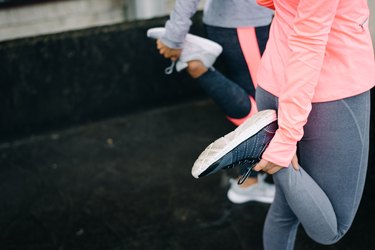
If you've got knee pain, it could be tendonitis. If the tendons are inflamed, it can cause pain and hinder movement, according to the U.S. National Library of Medicine. However, knee tendonitis exercises can help.
These exercises work by improving the strength and flexibility of your knee tendons and surrounding muscles. Seek the advice of your physician when you are having knee pain before beginning an exercise routine. For an individualized workouts for knee tendonitis, see a physical therapist.
Video of the Day
Video of the Day
Include Stability Exercises
Improving your stability is the foundation of knee tendonitis exercises. Knee tendonitis can cause muscle imbalances that affect your stability and range of motion. Reducing these imbalances will strengthen the tendons, thereby increasing the overall mobility of your knee. The stronger your knee is, the less likely you are to have recurring tendonitis.
These exercises can include simple stretching of the knee joint in all directions of motion and standing on one leg. Use a chair to help balance during these stability exercises. When you are ready to progress, sit on a stability ball and gently roll front to back and side to side. Once you are comfortable on the ball, add leg extensions and leg curls to your routine.
Boost Your Strength
Once knee stability is not an issue, you can progress to strength exercises. Begin by adding strength exercises to your routine using your own body weight before gradually adding weights.
For instance, single leg squats and wall squats are staple exercises to improve your knee joint and the muscles around your knee. As you become stronger, try leg extensions and leg curls on a machine with no weight before gradually adding weights to the machines.
Stretches for Knee Tendonitis
After your baseline knee strength has returned, you can add flexibility exercises to help your tendonitis. Advanced versions of your basic stretches will help you achieve this.
Try doing quadriceps and hamstring stretches while standing up or join a Pilates class led by a certified instructor, as advised by the Mayo Clinic. Reformer Pilates uses machines with pulleys and ropes in advanced flexibility routines.
Get in the Water
Swelling caused by tendonitis can make traditional exercises extremely painful. Doing water exercises are a viable alternative to help you complete the exercises with less pain as the amount of pressure through your joints is reduced, as explained by the University of Washington. The feel and temperature of the water can also be soothing to muscle aches and strains.
Using a kickboard, alternate doing flutter, backstroke and breaststroke kicks to loosen and strengthen the tendons around your knee. Water aerobics can be used to improve flexibility, range of motion, strength and postural alignment, which are all extremely beneficial in alleviating knee tendonitis.
Fix Underlying Issues
Knee tendonitis is primarily an overuse injury resulting from the biomechanics of your knee. With the help of an advanced trainer or therapist, you can adjust the biomechanics of knee movement to help alleviate your tendonitis.
This may include strengthening targeted muscles around your knee and using advanced stretching to loosen others. You may also be fitted for orthotics. Altering biomechanics is an advanced technique and requires medical direction.
Is this an emergency? If you are experiencing serious medical symptoms, please see the National Library of Medicine’s list of signs you need emergency medical attention or call 911.